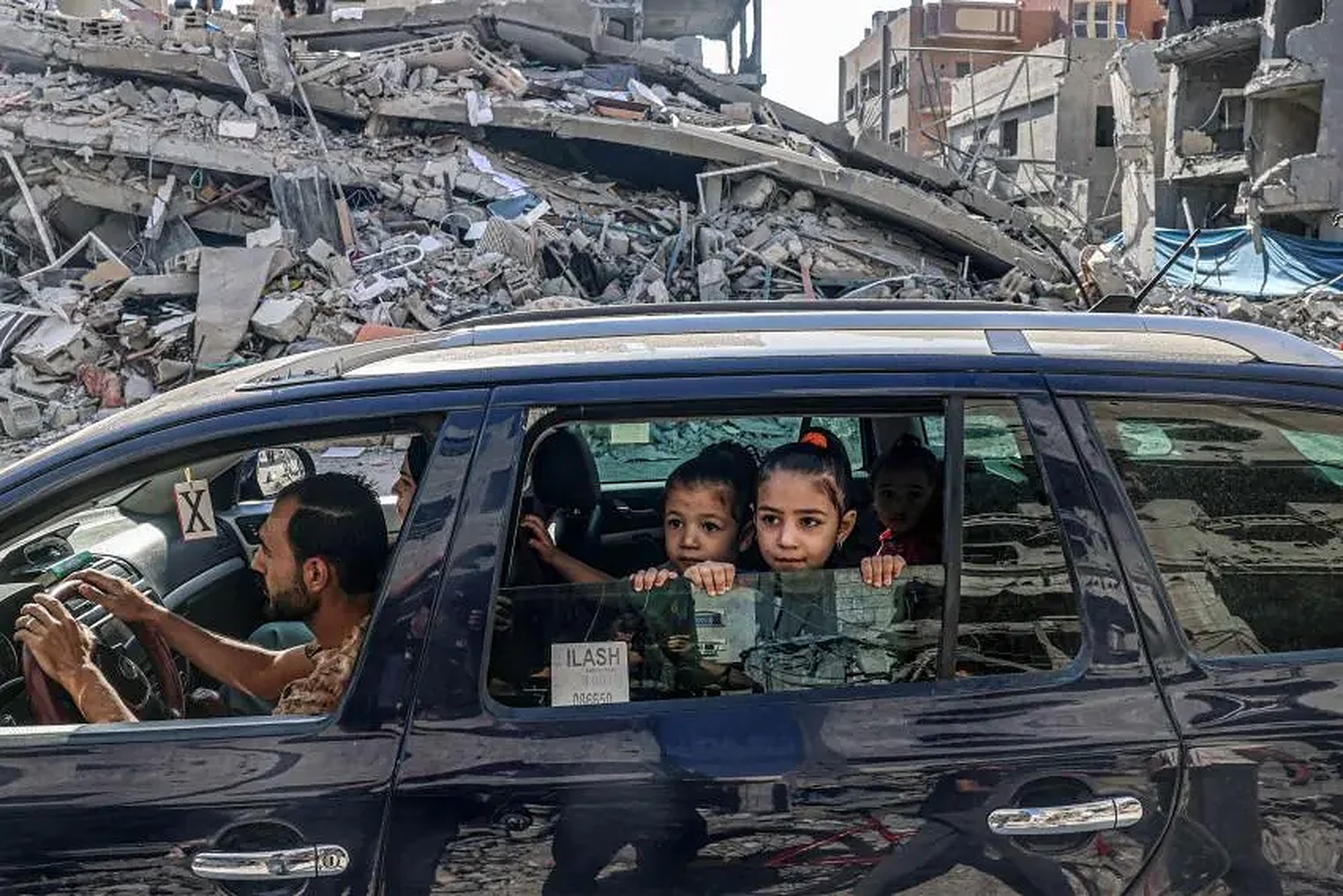The terms “self-defense,” “genocide,” and “ethnic cleansing” have been commonly used in light of recent events in Gaza and Israel. Numerous journalists, commentators, and other individuals have raised the issue of proportionality and self-defense without a thorough understanding of the terms’ legal definitions or their implications.
Most recently, leaders of the 27 nations that make up the European Union emphasized “Israel’s right to defend itself in accordance with humanitarian and international law” against the “violent and indiscriminate attacks carried out by the Hamas terrorist organization.”
In contrast, according to the UN human rights office, Israel’s total blockade of Gaza and order for one million Palestinians to evacuate could amount to a forceful transfer of residents, which is in violation of international law. The Israeli government has not yet taken any steps to ensure that people who were evacuated have enough housing and comfortable conditions, according to spokeswoman Ravina Shamdasani, who made the statement in Geneva on Tuesday, 17 October.
The contrasting statements regarding Israel’s right to self-defense beg an exploration of the meaning behind these concepts, as there is also a growing recognition that the right to self-defense is not absolute.
What, then, constitutes the system of international rules that is meant to regulate war and armed conflict?
The Right to Self-Defense: What Does it Mean?
At the outset, it is crucial to differentiate between law and morality, as there are actions that are legal but immoral, and there could be actions that are morally righteous but illegal under international law.
Before diving into the meaning behind the term ‘self-defense,’ it is important to note that Hamas’ attack on 7 October, which included shooting civilians en masse and kidnapping hostages, including women and children, are grave abuses of international law. UN experts have condemned the crimes committed by Hamas, as it constitutes deliberate killing and hostage-taking of innocent civilians.
It is also important to note that Israeli self-defense is a contentious issue, and the International Court of Justice (ICJ) and other legal authorities have been unable to come to a clear consensus on it due to inconsistencies in the current international legal frameworks. The vagueness of the term “self-defense” aggravates the existing power imbalance between nations. This allows powerful states to justify using force against less powerful states by accusing them of “aggression,” while their own aggressive actions within these states go unchallenged.
This was the justification used by Russia’s president Vladimir Putin, for example. Putin claimed that Russia had to destroy the grave threat posed by an adversarial Ukraine armed by the West and driven by a fascist ideology fostered by the US. Russia, according to Putin, was “repelling the aggression of neo-Nazis and their masters, fighting fiercely for its future.”
The idea that states should be prohibited from the use of force is one of the main tenets of international law, and represents the foundation of the legal system. Article 1 of the UN Charter specifically calls for maintaining international peace and security through “effective collective measures for the prevention and removal of threats to the peace” using peaceful means.
The only justification for a state to employ force outside of a UN Security Council mandate has been self-defense. However, this has given rise to numerous interpretations of the ideas of aggressiveness and self-defense. This provision must be read very strictly and excludes using force in retaliation for aggression against material objects, infrastructure or civilians.
In accordance with Article 51 of the UN Charter, self-defense is defined as the, “inherent right of individual or collective self-defense if an armed attack occurs against a Member of the United Nations, until the Security Council has taken measures necessary to maintain international peace and security.”
But there are two key terms to consider: necessity and proportionality. Necessity determines whether defensive force may be used to respond to an armed attack, and where it must be directed. Proportionality governs how much total force is permissible.
Throughout the course of an armed conflict motivated by self-defense, necessity and proportionality must be consistently upheld. This makes sure that defensive force does not unnecessarily interfere with the interests of third parties or undermine global peace and security. It also ensures that the goals of self-defense are satisfied and nothing more.
The International Criminal Court’s (ICC) founding treaty, the Rome Statute, declares that the sheer existence of an occupying force constitutes an act of war and an act of aggression, therefore the right to self-defense cannot be used to justify an occupation.
Furthermore, the International Court of Justice firmly established the inapplicability of the “self-defense” argument in the context of Israel’s illegal military occupation in its 2004 Advisory Opinion on the Legal Consequences of the Construction of a Wall.
“Israel does not claim that the attacks against it are imputable to a foreign State. The Court also [reported] that Israel exercises control over the Occupied Palestinian Territory and that, as Israel claims, the threat that justifies its need for self-defense arises inside, not outside, of that territory,” the Court stated in its advisory opinion. This means that the threat that justifies Israel’s self-defense comes from occupied territory, and Israel’s occupation is a belligerent act and a crime of aggression in which self-defense does not apply.
The exercise of self-defense should also be applied to international humanitarian law. Forced population transfers, such as Israel’s evacuation order for 1.1 million Palestinians, are crimes against humanity if they are “committed as part of a widespread or systematic attack directed against any civilian population, with knowledge of the attack.”
Essentially, for Israel to legally assert the right to self-defense, it must treat Palestine as a separate, sovereign state and guarantee the right to self-determination to Palestinians.
According to the ICJ’s Military and Paramilitary Activities ruling in Nicaragua vs. the United States of America (1986), a state’s claim of self-defense can only be upheld in the event of an “armed attack,” and even then, the claim can be nullified by using needless force and infringing upon the sovereignty and right to self-determination of another state.
According to Article 43 of the Hague Regulations, an occupying power is only permitted to use force within the territory it occupies in the course of routine law enforcement and may never launch attacks on civilians and civilian property. Instead of conducting itself in a way that makes it the most dangerous and life-threatening concern of the Palestinian people, Israel is required to act in the best interest of the occupied Palestinian population, provide protection to them, uphold the laws in effect in the occupied Palestinian territory, and take measures to ensure, to the extent possible, public order and the safety of the protected population.
Genocide and Ethnic Cleansing: What do They Mean?

The term ‘genocide’ was defined by the United Nations in the Convention on the Prevention and Punishment of the Crime of Genocide, which was adopted in 1948.
The treaty lists five actions that, if carried out with the intention of eradicating a group of people based on their ethnicity, nationality, race, or religion, might be considered genocide: killing members of the group, causing serious physical or mental harm, deliberately creating conditions that could lead to the group’s physical destruction, in whole or in part, preventing births, and forcibly transferring children.
Genocide must be committed with the intention of eradicating an entire group of people. However, a group or person can still commit ‘crimes against humanity’ or ‘ethnic cleansing’ without having their intention being genocide.
On the other hand, ethnic cleansing solely refers to the eviction of a group from a specific location.
Ethnic cleansing is described as “rendering an area ethnically homogeneous by using force or intimidation to remove persons of given groups from the area,” in the interim report S/25274 of a United Nations Commission of Experts tasked with investigating violations of international humanitarian law committed on the territory of the former Yugoslavia.
In its final report, the same Commission defined ethnic cleansing as: “a purposeful policy designed by one ethnic or religious group to remove by violent and terror-inspiring means the civilian population of another ethnic or religious group from certain geographic areas.”
The Commission of Experts further stated that the coercive methods used to remove the civilian population can include: homicide, torture, arbitrary arrest and detention, extrajudicial executions, rape and sexual assaults, severe physical harm to civilians, segregation of the civilian population in ghetto areas, forcible removal, displacement, and deportation of the civilian population, and intentional military attacks or threats of attacks on civilians and civilian areas.
Analysing these terms against the current context, there have been various reports of both genocide and ethnic cleansing. Minister for Social rights of Spain, Ione Belarra, has accused Israel of conducting a “planned genocide” in Gaza. It is unacceptable, she continued, to exploit the horrifying killings of Israeli citizens by Palestinian armed groups as an alibi for Israel’s crimes in general and the atrocity in Gaza in particular.
Historically, courts have had difficulty establishing a legal criterion for genocidal intent. Apart from the Rwandan genocide in 1994 and the Nazi dictatorship, few offenders have explicitly left plans outlining their intentions to wipe out groups.
However, there are signs of mass ethnic cleansing, as UN experts warn.
“There is a grave danger that what we are witnessing may be a repeat of the 1948 Nakba, and the 1967 Naksa, yet on a larger scale. The international community must do everything to stop this from happening again,” Francesca Albanese, UN Special Rapporteur on the situation of human rights in the Palestinian Territory occupied since 1967, said.
Israel’s government persistently refuses to cooperate with an International Criminal Court investigation, saying that the “Hague-based body has no authority to investigate Israel or its officials,” as Israel is not a party to the Rome Statute. However, scholars and practitioners of international law, Jewish civil society groups, Holocaust and genocide studies scholars, are warning of the potential genocide in Gaza.





Comments (3)
[…] Particularly noteworthy were the 20 songs he composed in praise of Palestine, which stood as powerful expressions of solidarity and support for the Palestinian people. […]
[…] post Palestine-Israel: Differentiating Between Self-Defense, Genocide, and Ethnic Cleansing first appeared on Egyptian […]